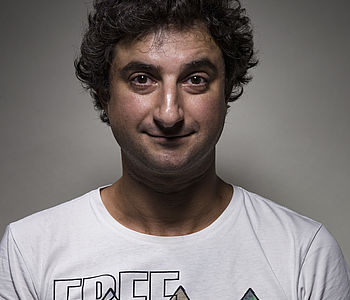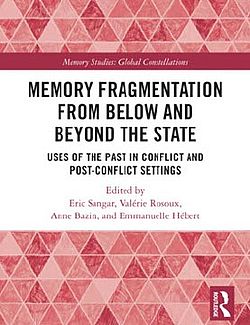Dr. Eric Sangar | Assoziierter Forscher

Mutterinstitut
:
Sciences Po Lille / CERAPS, Université de Lille
|
Position
:
Assistenzprofessor (Maître de conférences) in Politikwissenschaft
|
Fachbereich
:
Politikwissenschaft
|
Biographie
Eric Sangar arbeitet im Rahmen eines CNRS Fellowships am Centre Marc Bloch.
Seit 2018 unterrichtet er als Assistenzprofessor für Politikwissenschaft an der Hochschule Sciences Po Lille und ist Forscher im sozialwissenschaftlichen Zentrum CERAPS (Universität Lille). Vor seiner Ankunft in Lille arbeitete er in verschiedenen Positionen an europäischen Forschungseinrichtungen, unter anderem als FNRS Research Fellow an der Universität Namur (Belgien), als Research Associate am King's College London im Rahmen des EU-Projekts INFOCORE, sowie als Fernand Braudel Postdoctoral Fellow am Institut de Recherche Stratégique de l'Ecole Militaire (IRSEM) in Paris.
Er hat einen Doktortitel in Politik- und Sozialwissenschaften vom Europäischen Hochschulinstitut in Florenz und einen MA in International Affairs von Sciences Po Paris.
Forschungsthema
In seiner persönlichen Forschung untersucht er die Zusammenhänge zwischen kollektivem Gedächtnis und der politischen Nutzung historischer Erfahrungen in der Außenpolitik, die Rolle von Emotionen bei der Rechtfertigung politischer Gewalt, sowie Normdiffusionsprozesse in den deutsch-französischen Beziehungen. Eric Sangar hat Artikel in verschiedenen Peer-Review-Zeitschriften wie "Political Psychology", "Contemporary Security Policy" oder dem "Journal of Strategic Studies" veröffentlicht. Er ist Verfasser der Monographien "Historical Experience: Burden or Bonus in Today's Wars? The British Army and the German Bundeswehr in Afghanistan" (2014) und "Diffusion in Franco-German Relations: A Different Perspective on a History of Cooperation and Conflict" (2020). Als Mitherausgeber veröffentlichte er die Sammelbände "Researching Emotions in International Relations: Methodological Perspectives on the Emotional Turn" (2018, mit Maéva Clément) und "Memory Fragmentation from Below and Beyond the State" (2023, mit Anne Bazin, Emmanuelle Hébert und Valérie Rosoux).
Aktivitäten
Eric Sangar ist Programmverantwortlicher des deutsch-französischen Doppeldiploms von Sciences Po Lille und der Universität Münster (FIFA) und, zusammen mit Sami Makki, der Koordinator des Master-Programms "Stratégie, Intelligence, Gestion des Risques" (SIGR) von Sciences Po Lille.
Er ist außerdem Work Package Coordinator des von der französischen Forschungsagentur ANR finanzierten Forschungsprojekts (DATAWAR).
Die Analyse deutscher Außenpolitik mithilfe der Interaktionen zwischen strategischen Narrativen und gesellschaftlichen Erinnerungsdiskursen
Die Haupthypothese des Projekts ist es, den Mangel an Kohärenz der deutschen Außenpolitik seit dem Ende des Kalten Krieges mit der Fragmentierung kollektiver Erinnerung, das heißt dem Rückgang eines öffentlichen Konsenses über die Lehren der Nazi-Vergangenheit für die zeitgenössische deutsche Politik zu erklären. Weit davon entfernt, die Existenz "eines" kollektiven Gedächtnisses zu einem bestimmten Zeitpunkt postulieren zu wollen, bezieht sich der Begriff "Fragmentierung" vor allem auf eine zunehmend plurale, teilweise konfliktuelle, Koexistenz öffentlicher Erinnerungsdiskurse seit den 1980-er Jahren, einschließlich solcher, die einst von politischen Institutionen „marginalisiert“ wurden. So wäre Deutschlands Schwierigkeit, eine neue „grand strategy“ seit der Wiedervereinigung zu artikulieren, weniger auf die Unsicherheiten des internationalen Umfelds zurückzuführen, sondern vor allem auf die Fragmentierung kollektiver Erinnerungen innerhalb der Zivilgesellschaft, die die Fähigkeit der zeitgenössischen politischen Eliten einschränkt, ein neues strategisches Narrativ zu schmieden, das an die Stelle des "Zivilmacht"-Narrativs des Kalten Krieges treten könnte.
Memory Fragmentation from Below and Beyond the State: Uses of the Past in Conflict and Post-Conflict Settings.
22.Mai 2023Eric Sangar , Anne Bazin, Emmanuelle Hébert, Valérie Rosoux
Edition: Routledge London
ISBN: 9781003147251
ABSTRACT
This volume suggests a model of collective memory that distinguishes between two conceptual logics of memory fragmentation: vertical fragmentation and horizontal fragmentation. It offers a series of case studies of conflict and post-conflict collective memory, shedding light on the ways various actors participate in the production, dissemination, and contestation of memory discourses.
With attention to the characteristics of both vertical and horizontal memory fragmentation, the book addresses the plurality of diverging, and often conflicting, memory discourses that are produced within the public sphere of a given community. It analyzes the juxtaposition, tensions, and interactions between narratives produced beyond or below the central state, often transcending national boundaries.
The book is structured according to the type of actors involved in a memory fragmentation process. It explores how states have been trying to produce and impose memory discourses on civil societies, sometimes even against the experiences of their own citizens, and how such efforts as well as backlash from actors below and beyond the state have led to horizontal and vertical memory fragmentation. Furthermore, it considers the attempts by states’ representatives to reassert control of national memory discourses and the subsequent resistances they face. As such, this volume will appeal to sociology and political science scholars interested in memory studies in post-conflict societies.
Publikationen
Monographies :
- Historical Experience: Burden or Bonus in Today’s Wars? The British Army and the Bundeswehr in Afghanistan. Freiburg: Rombach, 2014.
- Diffusion in Franco-German Relations: A Different Perspective on a history of cooperation and conflict. Cham: Palgrave Macmillan, 2020.
Edition d’ouvrages collectifs et de numéros spéciaux / edited special issues and collective volumes :
- Memory Fragmentation from Below and Beyond the State: Uses of the Past in Conflict and Post-Conflict Settings. (co-edited with Anne Bazin, Emmanuelle Hébert, Valérie Rosoux). Routledge 2023.
- Researching Emotions in International Relations: Methodological Perspectives on the Emotional Turn. (co-edited with Maéva Clément). Cham: Palgrave Macmillan, 2018.
- "Krieg ohne Heimatfront?" Special issue of the journal Berliner Debatte Initial, 25 (2), 2014.
Articles publiés dans des revues pratiquant l’évaluation anonyme par les pairs / peer-reviewed research articles :
- "L’impact de la fragmentation des mémoires collectives nationales sur la politique étrangère : le cas de la France." In: Etudes internationales, 50 (1), 2019, 39-68.
- “How do non-governmental organizations influence media coverage of conflict? The case of the Syrian conflict, 2011–2014” (with Christoph Meyer and Eva Michaels). In: Media, War & Conflict 11 (1), 2017, 149-171.
- "'The ‘Hero-Protector Narrative': Manufacturing Emotional Consent for the Use of Force” (with Maéva Clément and Thomas Lindemann). In: Political Psychology (2017), 38 (6), 991-1008.
- “The pitfalls of learning from historical experience: the British Army’s debate on useful lessons for the war in Afghanistan.” In: Contemporary Security Policy, 37 (2), 2016, 223-245
- ”Die Rückkehr der Heimatfront? Frankreich nach dem 13. November 2015”. In: Berliner Debatte Initial, 27 (1), 2016, 88-93.
- ”From ‘Memory Wars’ To Shared Identities: Conceptualizing the Transnationalisation of Collective Memory” In: La Revue Tocqueville 36 (2), 2015, 65-93.
- “Défendre Duffer’s Drift : l’influence de la mémoire collective et du régime d’historicité sur le choix des enseignements historiques en temps de crise” In: Temporalités, 21, 2015, http://temporalites.revues.org/3085?lang=en
- “The weight of the past(s): the impact of the Bundeswehr’s use of historical experience on strategy-making in Afghanistan” In: Journal of Strategic Studies 38 (4), 2015, 411-444.
- "La présence de la Grande guerre dans les discours : persistance d’une « asymétrie » de mémoire franco-allemande ?” In : La Revue Tocqueville 35 (2), 2014, 119-143.
- “What’s African? Identifying Traits of African Security Governance” (with Fairlie Chappuis and Deniz Kocak) In: Journal of Regional Security 9 (1), 2014, 7-30.
- “The German Bundeswehr after Afghanistan – a return to which ‘normality’?” In: Polish Quarterly of International Affairs 23 (2), 2014, 27-42.
- “Editorial“ In: Berliner Debatte Initial 25 (2), 2014, 2-5.
- "Strategisches Denken in Deutschland nach Afghanistan: Die Renaissance der Technokraten der Gewalt?“ In: Berliner Debatte Initial 25 (2), 2014, 71-89.
Chapitres publiés dans des ouvrages collectifs et autres publications / Book chapters and other types of publication :
- « Why the Ukraine War Caught Europe by Surprise: Right Numbers, Wrong Predictions? ». Publication collective de l’équipe DATAWAR sur Books & Ideas, Octobre 2022, https://booksandideas.net/Why-the-Ukraine-War-Caught-Europe-by-Surprise.html
- « Bons chiffres, fausses prédictions ? Pourquoi la guerre en Ukraine a pris l’Europe par surprise ». Publication collective de l’équipe DATAWAR sur La Vie des Idées, Octobre 2022, https://laviedesidees.fr/Bons-chiffres-fausses-predictions.html
- « Les engagements violents des femmes : contournements discursifs sous le nazisme et sous l'État Islamique » (avec Maéva Clément), in : L. Aubry, G. Patiño-Lakatos & B. Turpin (Eds.), Les discours meurtriers d’aujourd’hui (pp. 77-95). Bruxelles : Peter Lang, 2022.
- Récension de : Hélène Miard-Delacroix, Andreas Wirsching (éd.), Emotionen und internationale Beziehungen im Kalten Krieg, Berlin: De Gruyter Oldenbourg 2020, in: Francia-Recensio 2021/2, DOI: https://doi.org/10.11588/frrec.2021.2.81996
- "Die Fragmentation nationalstaatlicher kollektiver Erinnerung und ihre Auswirkung auf strategische Narrative: Legitimationsschwierigkeiten deutscher Außenpolitik seit dem Ende des Kalten Kriegs". In F. Kießling & C. Rothauge (Eds.), Außenbeziehungen und Erinnerung: Funktionen, Dynamiken, Reflexionen (pp. 153-172). Berlin: De Gruyter, 2021.
- Exploring Practices of Conflict Data Production, Analysis, Dissemination, and Practitioner Reception: Methodological Framework and Preliminary Findings. DATAWAR Working Paper 2021/1 (with G. Anderson, L. Beaumais, L. Carnapete, I. Lambert, S. Makki, F. Ramel). Paris: CERI, 2021, https://www.sciencespo.fr/ceri/sites/sciencespo.fr.ceri/files/DATAWAR_workingpaper_1_2021.pdf
- "La Bataille des Eperons d'Or : une histoire de mythes en compétition". In B. Heuser & I. Davion (Eds.), Batailles : une histoire des grands mythes nationaux (pp. 127-138). Paris: Belin, 2020.
- “The Enduring Value of Reliable Facts: Why NGOs Have Become More Influential in Conflict Discourse” (with Christoph Meyer). In R. Fröhlich (Ed.), Media in War and Armed Conflict: The Dynamics of Conflict News Production and Dissemination (pp. 191-217). London: Routledge, 2018.
- “Courtrai, the Battle of the Golden Spurs 1302”. In B. Heuser & A. S. Leoussi (Eds.), Famous Battles and How They Shaped the Modern World: From Troy to Courtrai (pp. 121-135). Yorkshire (Philadelphia): Pen & Sword, 2018.
- “Introduction: Methodological Challenges and Opportunities for the Study of Emotions” (with Maéva Clément), in: M. Clément & E. Sangar (Eds.), Researching Emotions in IR: Methodological Perspectives on the Emotional Turn. Cham: Palgrave Macmillan, 2018, 1-29.
- “Of Heroes and Cowards: A Computer-Based Analysis of Narratives Justifying the Use of Force” (with Maéva Clément and Thomas Lindemann). In M. Clément & E. Sangar (Eds.), Researching Emotions in International Relations: Methodological Perspectives on the Emotional Turn. Cham: Palgrave Macmillan, 2018, 179-206.
- “Measuring Transnational Memory? Discovering the Potential of the Corpus-Linguistic Analysis of Historical References in Debates on Current Conflict.” In B. Mottura, L. Osti & G. Riboni (Eds.), Media and Politics: Discourses, Cultures, and Practices Newcastle upon Tyne: Cambridge Scholars Publishing, 2017, 330-355.
- Recension/Review “P. Münch, Die Bundeswehr in Afghanistan: Militärische Handlungslogik in internationalen Interventionen.“ In: Defence Studies, 2016, http://dx.doi.org/10.1080/14702436.2016.1222868
- “La présence de l’histoire dans les relations stratégiques : influence inconsciente ou ressource rhétorique ?“ Note de recherche stratégique n°16, décembre 2014, Institut de recherche stratégique de l’Ecole militaire (IRSEM), http://www.defense.gouv.fr/content/download/343711/4847884/file/NRS_n16_2015.pdf
- “NGOs, Media And Conflict: Conceptual Framework” (with Christoph Meyer). INFOCORE Working Paper 2014/04, http://www.infocore.eu/wp-content/uploads/2014/12/INFOCORE-conceptual-framework-WP4_NGOs-and-media.pdf
- “Les relations armées-société en Allemagne” (with Nadja Douglas), in: La Lettre de l’IRSEM, 2014 (1), 6-9. Disponible sur : http://www.defense.gouv.fr/content/download/237677/2704250/file/Lettre%201%20-%202014%20V2[1].pdf
- Recension / review “Théorie du drone, par Grégoire Chamayou”, in: La Lettre de l’IRSEM, 2014 (6), 36-37.
- Recension / review “P. Dixon: The British Approach to Counterinsurgency: From Malaya and Northern Ireland to Iraq and Afghanistan” In: Defence Studies, 2014, DOI: http://dx.doi.org/10.1080/14702436.2014.972105
- “Die Bundeswehr in Afghanistan: Grenzen einer erfundenen Tradition“. In: M. Daxner (Ed.), Deutschland in Afghanistan. Oldenburg: BIS-Verlag, 2014, 115-138.
- “Les relations armées-société en Allemagne” (with Nadja Douglas), in: La Lettre de l’IRSEM, 2014 (1), 6-9.
- "The Past Stimulating the Change? The Use of Historical Experience by the British and American Armies in Iraq and Afghanistan”. In: Militärgeschichtliches Forschungsamt der Bundeswehr (Ed.): Auftrag Auslandseinsatz: Neueste Militärgeschichte an der Schnittstelle von Geschichtswissenschaft, Politik, Öffentlichkeit und Streitkräften. Freiburg: Rombach, 2012, 355-365.
- “Historical Experience as an Intellectual Resource Fostering Operational Change: The German and British Armies in Afghanistan”. In: Institut de Recherché Stratégique de l’Ecole militaire (Ed.): L’académie de la boue : Regards croisés sur l’apprentissage des forces armées. Paris: Ministère de la défense et des anciens combattants, 2012, 26-39.
- “Fratricide”. In: Online Encyclopedia of Mass Violence. Paris: Sciences Po. Disponible sur: http://www.massviolence.org/IMG/article_PDF/Fratricide.pdf
- “Classicide”. In: Online Encyclopedia of Mass Violence. Paris: Sciences Po. Disponible sur: http://www.massviolence.org/IMG/article_PDF/Classicide.pdf
